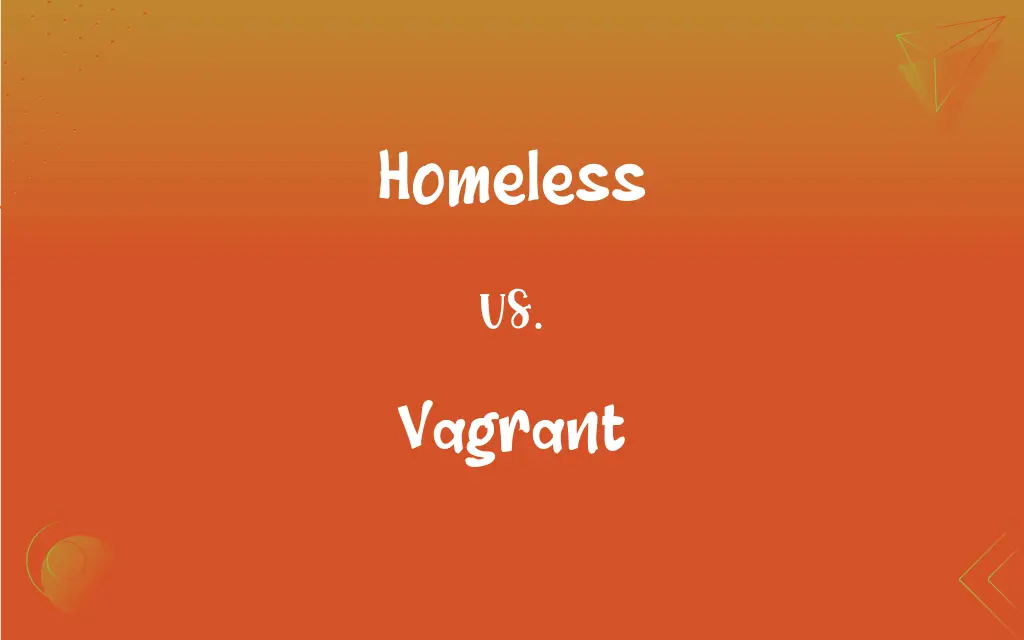Homeless vs. Vagrant: What's the Difference?
Edited by Aimie Carlson || By Janet White || Updated on December 20, 2023
Homelessness refers to the state of having no permanent residence, while vagrancy describes a lifestyle of wandering without a regular job or home.

Key Differences
Being homeless means lacking a fixed, regular, and adequate nighttime residence. In contrast, a vagrant not only lacks a permanent home but typically wanders and may avoid steady employment.
Homelessness is a broad term that includes individuals temporarily without homes due to various circumstances. Vagrancy, however, often implies a choice of transient lifestyle and sometimes non-conformity to societal norms.
The term homeless encompasses a range of living situations, including sheltered and unsheltered individuals. Vagrants are often characterized by their itinerant nature, moving frequently without a fixed destination.
Homelessness can be a result of economic hardship, lack of affordable housing, or personal crises. Vagrancy, on the other hand, may be associated with a deliberate choice to live outside mainstream society.
Efforts to assist the homeless usually focus on providing housing and support services. In contrast, addressing vagrancy often involves social services aimed at reintegration into a more stable lifestyle.
ADVERTISEMENT
Comparison Chart
Definition
Lacking a permanent residence
Wandering without regular job or home
Implication
Economic hardship, lack of housing
Choice of transient lifestyle
Living Situation
Sheltered or unsheltered
Itinerant, frequently moving
Societal Perception
Often sympathetic
Sometimes viewed as non-conforming
Focus of Assistance
Housing and support services
Social services for reintegration
ADVERTISEMENT
Homeless and Vagrant Definitions
Homeless
Homeless individuals may live in shelters, temporary housing, or on the streets.
Volunteers distributed warm clothing to homeless people in the area.
Vagrant
A vagrant is someone who wanders and lives without a fixed home or job.
The vagrant traveled from town to town, doing odd jobs.
Homeless
Homelessness can result from economic hardship or personal crises.
The economic downturn left many families homeless.
Vagrant
Vagrancy often involves a nomadic lifestyle outside societal norms.
The park became a temporary place for vagrants to rest.
Homeless
Homelessness includes a range of situations from temporary to chronic.
The charity focuses on providing meals to homeless individuals.
Vagrant
Vagrants may choose their lifestyle due to a desire for freedom or non-conformity.
He lived as a vagrant, preferring the open road to a settled life.
Homeless
Homeless persons often lack stable, safe, and adequate housing.
The new policy aims to reduce the number of homeless children.
Vagrant
Vagrants are typically characterized by their transient and itinerant nature.
Vagrants were often seen camping on the outskirts of the city.
Homeless
Homeless refers to someone without a permanent place to live.
The city is developing new programs to help the homeless.
Vagrant
Vagrancy can sometimes involve avoiding traditional employment.
The vagrant relied on sporadic work rather than a steady job.
Homeless
Having no home or haven.
Vagrant
One who wanders from place to place without a permanent home or a means of livelihood.
Homeless
People without homes considered as a group. Often used with the.
Vagrant
(Archaic) A wanderer; a rover.
FAQs
What causes homelessness?
Homelessness can be caused by various factors including economic hardship, lack of affordable housing, and personal crises.
Are all homeless individuals vagrants?
No, not all homeless individuals are vagrants; many are seeking stable housing and employment.
Can homelessness be temporary?
Yes, homelessness can be a temporary situation for many individuals.
Do vagrants contribute to society?
Vagrants may contribute in non-traditional ways but their contributions are often overlooked due to their lifestyle.
Do vagrants work?
Vagrants may work occasionally or sporadically but often avoid regular employment.
How does society perceive the homeless?
Society's perception of the homeless varies, with some viewing them sympathetically, while others may have misconceptions.
Is vagrancy a choice?
Vagrancy can be a choice for some, preferring a nomadic lifestyle to traditional living.
What support is available for the homeless?
Support for the homeless often includes shelters, food programs, and assistance with finding housing and employment.
Are children affected by homelessness?
Yes, children can be affected by homelessness, impacting their health, education, and overall well-being.
Is it illegal to be homeless?
Being homeless is not illegal, but certain activities associated with homelessness may be regulated.
What leads to vagrancy?
Factors leading to vagrancy can include a desire for freedom, escape from societal pressures, or personal circumstances.
Can vagrancy be a lifestyle choice?
Yes, for some, vagrancy is a deliberate lifestyle choice.
How can society help address homelessness?
Society can help by supporting affordable housing initiatives, providing social services, and advocating for policy changes.
Do vagrants have a fixed residence?
Vagrants typically do not have a fixed residence and often move from place to place.
How do communities address vagrancy?
Communities address vagrancy with a combination of law enforcement and social services aimed at integration.
Are vagrants always on the move?
While many vagrants are constantly on the move, some may stay in one area for extended periods.
What role do shelters play for the homeless?
Shelters provide temporary refuge, safety, and basic necessities for homeless individuals.
What challenges do homeless people face in finding employment?
Challenges include lack of a permanent address, limited access to resources, and potential stigmatization.
What are the health concerns for the homeless?
Homeless individuals face various health concerns including exposure to the elements, lack of medical care, and nutritional deficiencies.
Do vagrants have access to healthcare?
Vagrants often have limited access to healthcare, which can be a significant challenge.
About Author
Written by
Janet WhiteJanet White has been an esteemed writer and blogger for Difference Wiki. Holding a Master's degree in Science and Medical Journalism from the prestigious Boston University, she has consistently demonstrated her expertise and passion for her field. When she's not immersed in her work, Janet relishes her time exercising, delving into a good book, and cherishing moments with friends and family.
Edited by
Aimie CarlsonAimie Carlson, holding a master's degree in English literature, is a fervent English language enthusiast. She lends her writing talents to Difference Wiki, a prominent website that specializes in comparisons, offering readers insightful analyses that both captivate and inform.







































































